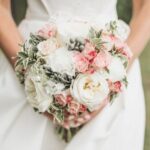Wedding Photography – 11 Tips for Amateur Wedding Photographers
Make a shot list
One of my favorite tips for wedding photography is to ask the couple to plan ahead and think about what shots they would like to have taken.
Make a list and check off each shot. This is especially useful for family photos. It’s not good to get the photos back only to realize that you didn’t take the happy couple with Grandma.
Locate a family photographer for wedding photography
The family photo portion of the day can be very stressful, according to me. You don’t know what the family dynamics are, people are moving all around, it can get chaotic.
Ask the couple to nominate one family member or one from each side who will be the “director” for the shoot. They can gather everyone together, get them into the shot, and keep the party moving so the couple can return to the party.
Scout the area
Before the big day, visit the locations.
Although I know most professionals don’t do it, I find it very helpful to know where I am going and what positions I can use for shots. I also know how the light will affect my photos. Before a couple of weddings, I visited the locations and took some test shots. These made great “engagement photos”.
Preparation is the key to Amateur Wedding Photographers
There are many things that can go wrong, so it is important to be prepared. Make sure you have a plan B in case of bad weather, keep your batteries charged and your memory cards empty. Also, be prepared to think about the routes and times that you will need to reach certain places. To ensure you are fully aware of what is happening, get an itinerary for the entire day. Attend the rehearsal of your ceremony if you can. You’ll learn a lot about the possible locations to shoot from, lighting options, and the order of the ceremony.
Set your expectations for the couple
Show your work to the couple. Ask them what they are looking for, how many photos they need, the key items they would like to see recorded and how they will use the images (for prints, etc.). Make sure they are clear about the price you will charge for the event.
Your camera’s sound should be turned off
The event is not enhanced by beeps at speeches, the kiss, or vows. You can turn off the camera sounds before the event and leave them on.
Take care of the little details
Photograph rings, backs for dresses, shoes and flowers, as well as table settings and menus, are all examples. These add an extra dimension to the final album. For inspiration, take a look at a magazine about Amateur Wedding Photographers.
Use two cameras
You can borrow, borrow, hire or steal an additional camera to use for the day and then set it up using a different lens. One wide-angle lens is great for candid shots, and also in tight spaces. I prefer to use a 70-200mm lens to capture the day.
Hire a second photographer for your wedding.
A second photographer is a great idea. This allows one photographer to take the formal shots and the other can capture candid shots. It also makes it easier for the guests to move around during speeches and ceremonies. You don’t have to be the one who gets every shot.
Be bold, but not overbearing
You won’t get the shot if you are too quiet, so you have to be bold in order to capture that moment.
Timing is everything. It is crucial to plan ahead so you are in the right place at the right time.
I move about 4-5 times during a ceremony. However, my movements should be timed to match songs, sermons or longer readings. Be bold and clear during formal shots. At this stage, you’re the driving force of the show and must keep it moving.
Learn how diffused light can be used
It is crucial to be able to bounce or diffuse light. Many churches have very low light levels. You might consider whether you can use a flash, which is not allowed in all churches.
You can use a flash if you are unable to use one. If that happens, you will need a fast lens with wide apertures or an ISO setting. You might also consider a lens with image stabilization. Learn more about flash diffusers or reflectors.
Read Also:
https://www.studywedding.com/paint-your-wedding/
https://www.studywedding.com/celebrity-couples/
https://www.studywedding.com/tom-brady-and-gisele-bundchen-get-married/
https://www.studywedding.com/wedding-to-blake-knight/
https://www.studywedding.com/wedding-menu/
https://www.studywedding.com/wedding-dress-is-safe/
https://www.studywedding.com/wedding-tradition/
https://www.studywedding.com/sign-your-marriage-license/
https://www.studywedding.com/impact-romantic-relationships/
https://www.studywedding.com/tips-for-taking-your-relationship-from-friends-to-more/




